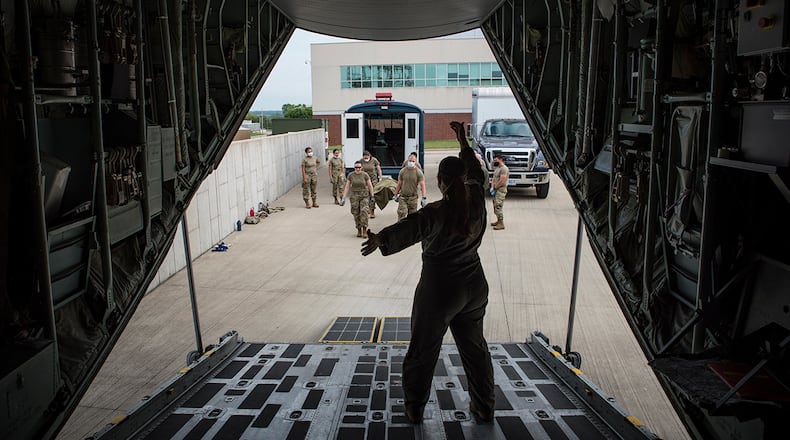“The 88th Medical Group reached out to us to assist them in some deployment training, specifically for a group of medics who needed to be trained on patient loading and how to work with flight crews during evacuations of injured warfighters or family members,” said Elizabeth Miller, deputy chair of the En Route Care Department at USAFSAM.
The medics, who will be expected to work alongside other aeromedical-evacuation personnel such as flight nurses and physicians, received instruction on how to move mildly and critically wounded or injured patients back and forth between the AMBUS and airframes for transport.
These loading and unloading crews are a small but important piece in the whole puzzle, said Tech. Sgt. Robert Van Aken, a USAFSAM instructor and medical technician.
“It all comes down to the safety of the wounded warfighter or the sick family member,” he said.
Another USAFSAM instructor explained that training these medics is a win-win because not only will they get the proper deployment skill sets, they’ll receive the same training all aeromedical-evacuation teams get. They will learn their roles in that larger mission.
“This kind of opportunity – to train medics here with the true aeromedical-evacuation system and not just downrange once they arrive – really helps the larger team and our missions,” said Capt. Alicia Houston, flight nurse instructor at USAFSAM.
Maj. Scott Suter, 88 MDG’s Medical Readiness Flight commander, said that while this was just a one-off training event, he hopes to work with USAFSAM more in the future.
“USAFSAM provides great training opportunities for our deploying medical professionals, and this resource is right here in our own backyard at Wright-Patt,” he said. “My goal is to work to strengthen this relationship to enhance readiness, and ultimately, ensure our injured Airmen are returned safely to their families.”
Other USAFSAM instructors who volunteered to provide this training include Tech. Sgt. Jacob Appleby and Tech. Sgt. Erin Grimme.
The U.S. Air Force School of Aerospace Medicine, which falls under the Air Force Research Laboratory’s 711th Human Performance Wing at Wright-Patterson Air Force Base, is an internationally renowned center for aerospace-medical learning, consultation, aerospace-medical investigations and aircrew-health assessments.
Personnel promote readiness and protect force and community health by using a range of tools and expertise, including environmental and health surveillance, laboratory and risk analysis, process re-engineering, consultation and technological innovation to maximize operational health capabilities and solve problems through ingenuity and partnerships. USAFSAM instructors train about 6,000 students each year.
About the Author


